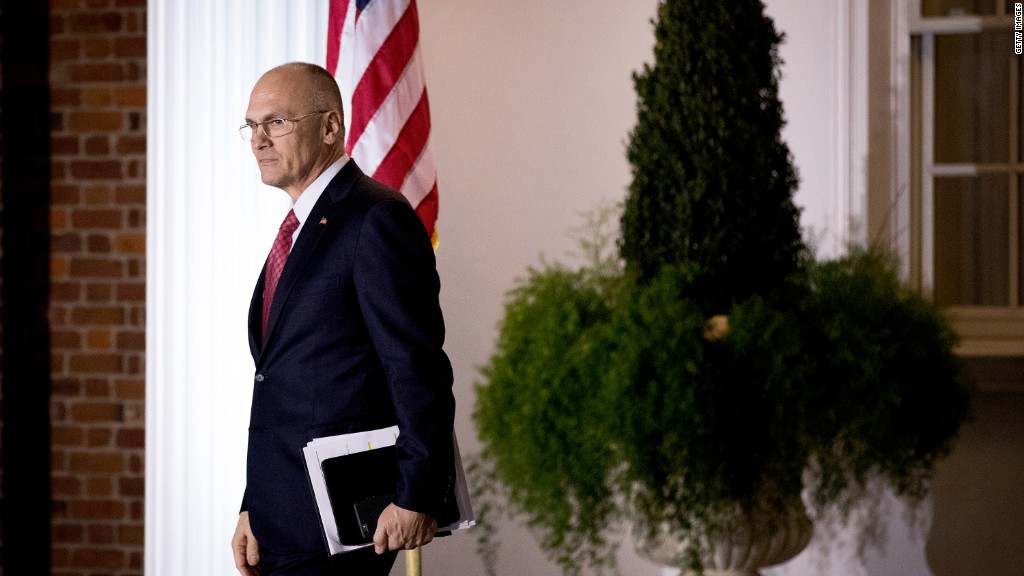
Andrew Puzder really dislikes Trumponomics. That makes him a curious choice to be Donald Trump's Labor secretary.
In past speeches and op-eds, the Carl's Jr. and Hardee's CEO has slammed policies that are now tenets of Trump's economic plan. He argued that they betray fiscal conservatism.
As Labor secretary, Puzder likely wouldn't have much to do with setting economic policy -- he would be the chief workplace regulator and the government's negotiator with its public employee unions.
The big question remains whether Republicans like Puzder will stand up to the president if his economic program continues to break with the party's longstanding support of austerity and free market principles.
"As Labor Secretary, Andy's focus will be on working with President-elect Trump to advance policies that will protect American workers, eliminate burdensome regulations that stunt wages and suppress growth, and establish new immigration controls that put American workers first," Trump transition spokeswoman Liz Johnson told CNNMoney.
Here's how Puzder and Trump differ.
1. Short-term government incentives for businesses
Puzder is opposed to government handouts to individual businesses -- like the kind Indiana offered Carrier under a job-saving deal that Trump took credit for.
"The problem is businesses don't invest in growth tomorrow based on temporary government benefits today," Puzder said in a February speech to the Adam Smith Society, an organization that promotes free markets. The government does a poor job handpicking the companies and individuals that should receive a cash influx, Puzder said.
Carrier will get $7 million in financial incentives from the state of Indiana over the next 10 years to keep 800 jobs in the U.S. The deal was brokered by Vice President-elect Mike Pence.
2. Infrastructure spending
Puzder has also chafed at the idea that infrastructure spending does more than create short-term jobs.
"We actually could use a little infrastructure spending, but don't expect it to grow the economy," Puzder said in an interview on Fox Business in July. "To grow the economy, you don't build a bridge -- you build a business."
Trump wants to invest $1 trillion in infrastructure over the next 10 years to boost employment.
"You don't build roads and bridges to create jobs," Puzder said to the Adam Smith Society in the February speech. "That's 'Field of Dreams' economics."
3. Immigration
Puzder has tried to play down his differences with Trump on trade and immigration. But he admits they don't always agree.
"We don't see eye to eye with Mr. Trump on everything. In our opinion, legal immigrants are an asset to the country," Puzder wrote in a joint Wall Street Journal editorial with conservative economic writer Stephen Moore in July. "We believe that deporting 11 million people is unworkable, and we hope in the end Mr. Trump comes to this same conclusion."
Puzder wrote that he only approves of deportation when an "illegal" immigrant has committed a felony or becomes dependent on government for subsistence. During his campaign, Trump said he wants to deport all undocumented immigrants.
Since the election, Trump has said he'll focus on investigating visa programs. Puzder wrote in the Journal that reducing visa overstays is "reasonable and sensible given that voters demand action."
4. Trade
"We are also free traders and oppose punitive tariffs," Puzder and Moore wrote in the same piece. "The U.S. needs trade."
Trump is against the Trans-Pacific Partnership and has threatened to kill NAFTA. He's also proposed a 35% tariff on U.S. companies that move manufacturing abroad and then import goods back into the United States.
5. Minimum wage
Puzder has consistently stood against raising the federal minimum wage, which he says would raise costs for employers and force them to rely more on automated technology.
Trump said over the summer he could support raising the federal minimum wage to $10 an hour from $7.25. But he's flip-flopped on the issue, so it's hard to know where he stands.
Puzder wavered when asked to defend Trump's support of $10 on Fox Business in July.
"Don't lock into the $10," he said. "$10 is a very high number, and it would kill jobs."
In a CNN interview with Poppy Harlow in August, Puzder cited a Congressional Budget Office study that said raising the minimum wage to $10 an hour would kill 500,000 jobs.
"I think that the minimum wage should be raised to the point where it doesn't eliminate a substantial number of jobs," he said, though he noted the study could be out of date.
